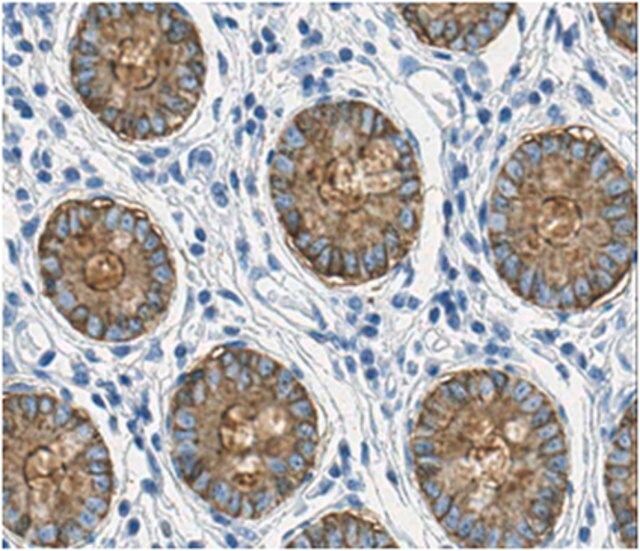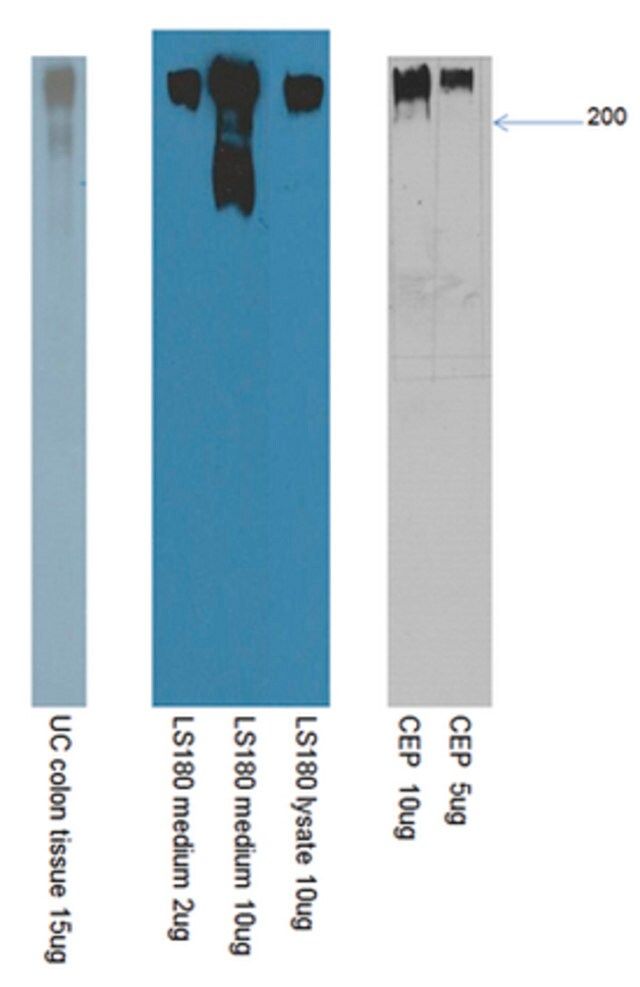您的位置:首页 > 产品中心 > Anti-CEP Antibody, clone Das-1 (7E12H12)
Anti-CEP Antibody, clone Das-1 (7E12H12)

产品别名
Anti-CEP Antibody, clone Das-1 (7E12H12)
Colon epithelial protein, CEP, Das-1 protein
基本信息
| eCl@ss | 32160702 |
| NACRES | NA.41 |
| General description【一般描述】 | The monoclonal antibody (mAb) Das-1 was originally desiganted as clone 7E12H12 and was thought to target a 40 kDa colon-specific tropomyosin (TM) isoform or a TM-related protein. It was later found that this clone specifically immunoprecipitated a high molecular weight chaperone protein that targets tropomyosin 5 (TM5) in human colon epithelial cells and subsequently named Colon Epithelial Protein (CEP). The Das-1 target is a glycoprotein with variable apparent sizes depending on the level of glycosylation. The target glycoprotein immunoprecipitated from the plasma membrane of DLD-1 colon cancer cells appears with an apparent molecular size of 185 kDa, while the target isolated from LS-180 colon cancer cells migrates with a size range extends to greater than 200 kDa. Das-1/CEP immunoreactivity is reported to be associated with Barrett′s metaplasia, Barrett′s adenocarcinoma, as well as with gastric adenocarcinomas and carcinoma-associated intestinal metaplasia, but no reactivity has been found in normal esophageal, gastric or small intestinal mucosa. When tested by ELISA and imunoblotting against recombinant human tropomyosins isoforms 1-5, none of five hTM isoforms reacted with mAB DAS-1. As determined by immunofluorescence and FACS analyses, CEP/Das-1 immunoreactivity is detected in several colon cancer lines (DLD-1, LS180, T84), but not in the colorectal adenocarcinoma cell line HT-29. CEP/Das-1 immunoreactivity is not detected among non-colonic epithelial cell lines (293-T, HeLa, pancreatic cancer) or hematopoietic lines (K562, KGI, Daudi). |
| Specificity【特异性】 | Clone 7E12H12 (mAb DAS-1) specifically reacts with Colon Epithelial Protein (CEP), but not human tropomyosins isoforms (hTM1-5). CEP/Das-1 immunoreactivity is detected in several colon cancer lines (DLD-1, LS180, T84), but not in the colorectal adenocarcinoma cell line HT-29. CEP/Das-1 immunoreactivity is not detected among non-colonic epithelial cell lines (293-T, HeLa, HUVEC, pancreatic cancer) or hematopoietic lines (K562, KGI, Daudi). |
| Immunogen【免疫原】 | Human colonic protein extract. |
| Application【应用】 | Anti-CEP Antibody, clone Das-1 (7E12H12) is an antibody against CEP for use in Immunohistochemistry (Paraffin), Western Blotting, Immunoprecipitation, ELISA, Dot Blot. Western Blotting Analysis: Prior to the production of Cat. No. MABC530 by ion-exchange chromatography, the CEP immunoreactivity of the ascites was determined by Western blotting against ulcerative colitis (UC) tissue homogenates, LS-180 colon adenocarcinoma cell lysates, LS180 culture supernatant, and purified CEP (Courtesy of Dr. Kiron M. Das, UMDNJ-Robert Wood Johnson Medical School, New Jersey). Western Blotting Analysis: A representative lot detected elevated CEP (colon epithial specific protein) levels among intraductal papillary mucinous neoplasm (IPMN) patients samples with high-risk/malignant lesions (Das, K.K., et al. (2014). Gut. 63(10):1626-1634). Western Blotting Analysis: A representative lot detected CEP in colon adenocarcinoma cell line LS180 and in isolated colon epithelial cells, as well as in LS-180 culture supernatant, but not in normal jejunal epithelial cells (Kesari, K.V., et al. (1999). Clin. Exp. Immunol. 118(2):219-227). Immunoprecipitation Analysis: A representative lot co-immuoprecipitated tropomyosin 5 with CEP from the culture supernatant of human adenocarcinoma cell line LS180 (Kesari, K.V., et al. (1999). Clin. Exp. Immunol. 118(2):219-227). ELISA Analysis: A representative lot was used as the capture antibody in combination with the isotype switched mAb Das-1 IgG as the detection antibody using purified CEP and cyst fluid samples from Intraductal papillary mucinous neoplasm (IPMN) patients (Das, K.K., et al. (2014). Gut. 63(10):1626-1634). Immunohistochemistry Analysis: A representative lot detected significantly higher CEP (colon epithial specific protein) immunoreactivity among intraductal papillary mucinous neoplasm (IPMN) patients samples with high-risk/malignant lesions (Das, K.K., et al. (2014). Gut. 63(10):1626-1634). Immunohistochemistry Analysis: Representative lots detected CEP (colon epithial specific protein) immunoreactivity by both fluorescent and non-fluorescent immunhistochemistry in colonic, but not small intestinal, enterocytes using both frozen and formalin-fixed, paraffin-embedded tissue sections (Moriichi, K., et al. (2009). Int. J. Cancer. 124(6):1263-1269; Piazuelo, M.B., et al. (2004). Mod. Pathol. 17(1):62-74; MIrza, Z.K., et al. (2003). Gut. 52(6):807-812; Glickman, (2001). J.N., et al. Am J Surg Pathol. 25(1):87-94; Griffel, L.H., et al. (2000). Dig. Dis. Sci. 45(1):40-48; Hamilton, M.I., et al. (1995). Clin. Exp. Immunol. 99(3):404-411; Halstensen, T. S., et al. (1993). Gut. 34(5):650-657; Das, K.M., et al. (1987). J. Immunol. Vol. 139(1):77-84). Dot Blot Analysis: A representative lot detected CEP immunoreactivity in colon protein extracts (Hamilton, M.I., et al. (1995). Clin. Exp. Immunol. 99(3):404-411). |
| Quality【质量】 | Evaluated by Immunohistochemistry in human colon tissue. Immunohistochemistry Analysis: A 1:1,000 dilution of this antibody detected CEP in human colon tissue. |
| Physical form【外形】 | Purified by Ion-Exchange Chromatography Format: Purified |
| Other Notes【其他说明】 | Concentration: Please refer to lot specific datasheet. |
产品性质
| Quality Level【质量水平】 | 100 |
| biological source【生物来源】 | mouse |
| antibody form【抗体形式】 | affinity purified immunoglobulin |
| antibody product type | primary antibodies |
| clone【克隆】 | 7E12H12, monoclonal |
| species reactivity | human |
| technique(s) | ELISA: suitable dot blot: suitable immunohistochemistry: suitable (paraffin) immunoprecipitation (IP): suitable western blot: suitable |
| isotype【同位素/亚型】 | IgMκ |
| shipped in【运输】 | wet ice |
产品说明
| Target description【目标描述】 | >200 kDa observed. Variable depending on levels of glycosylation. |
| 【免责声明】 | Unless otherwise stated in our catalog or other company documentation accompanying the product(s), our products are intended for research use only and are not to be used for any other purpose, which includes but is not limited to, unauthorized commercial uses, in vitro diagnostic uses, ex vivo or in vivo therapeutic uses or any type of consumption or application to humans or animals. |
安全信息
| Storage Class Code【储存分类代码】 | 10 - Combustible liquids |
| WGK | WGK 2 |





